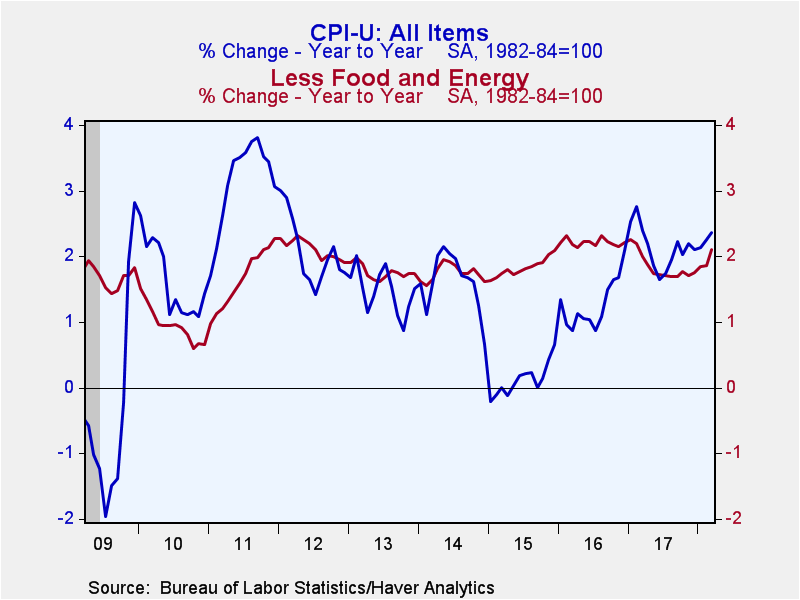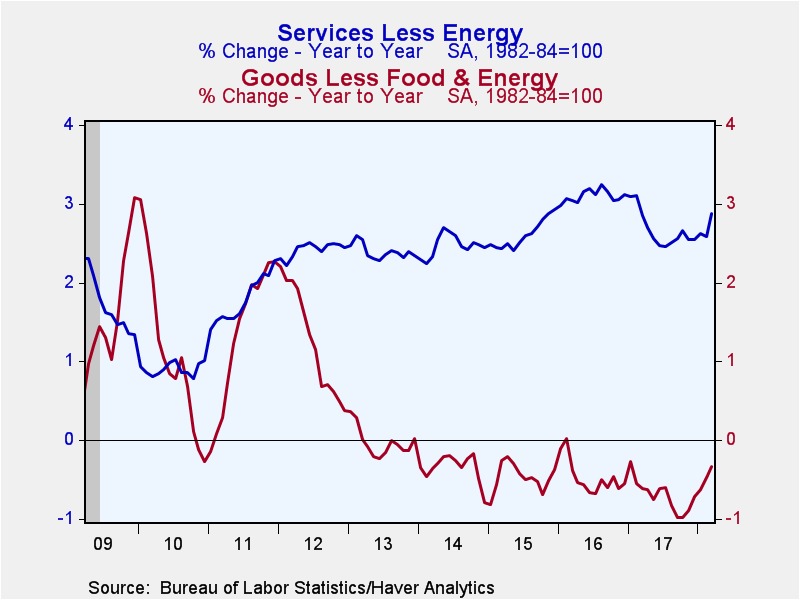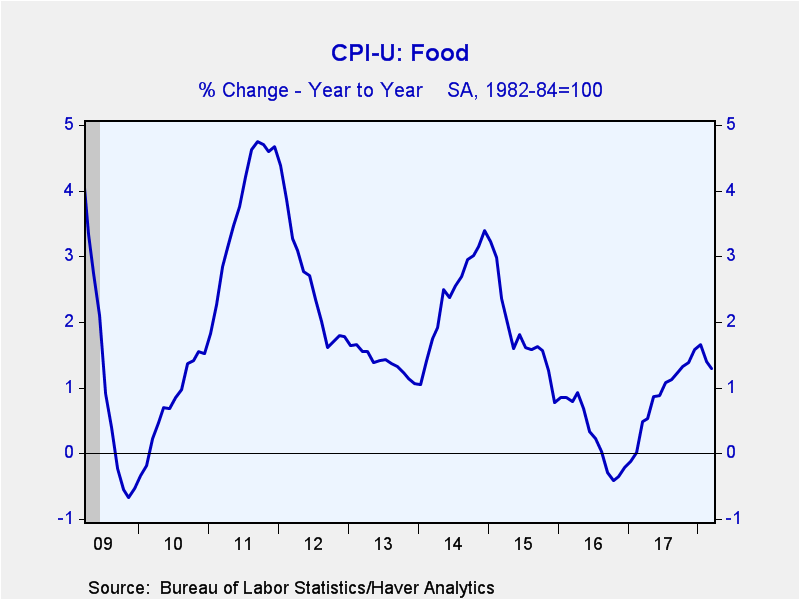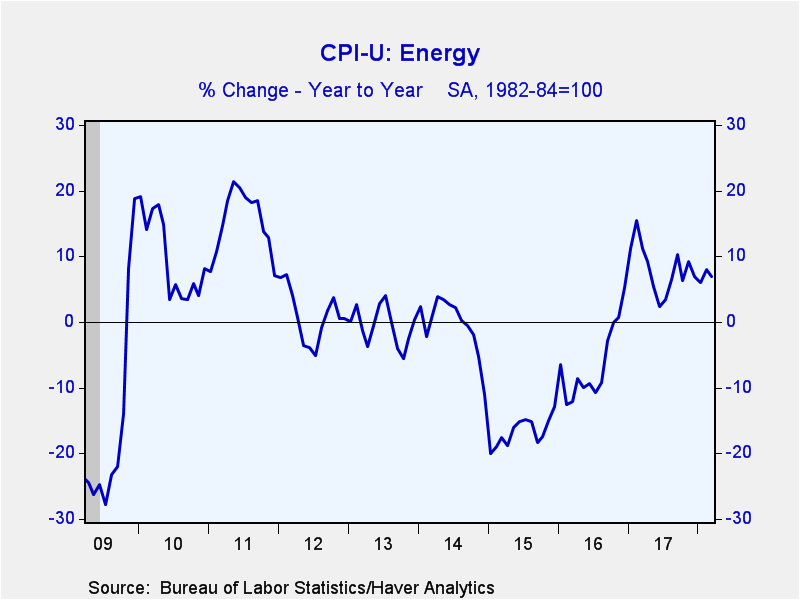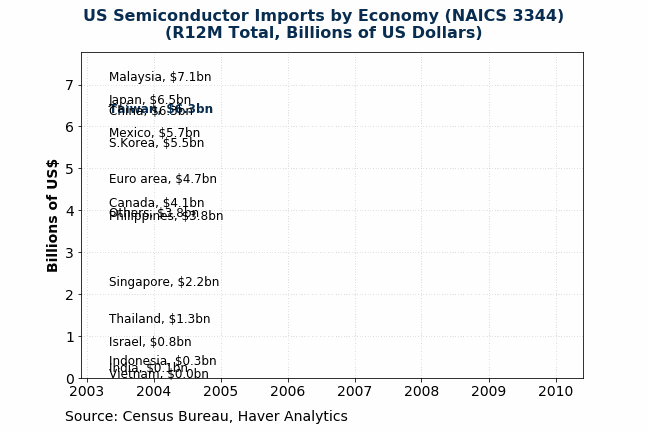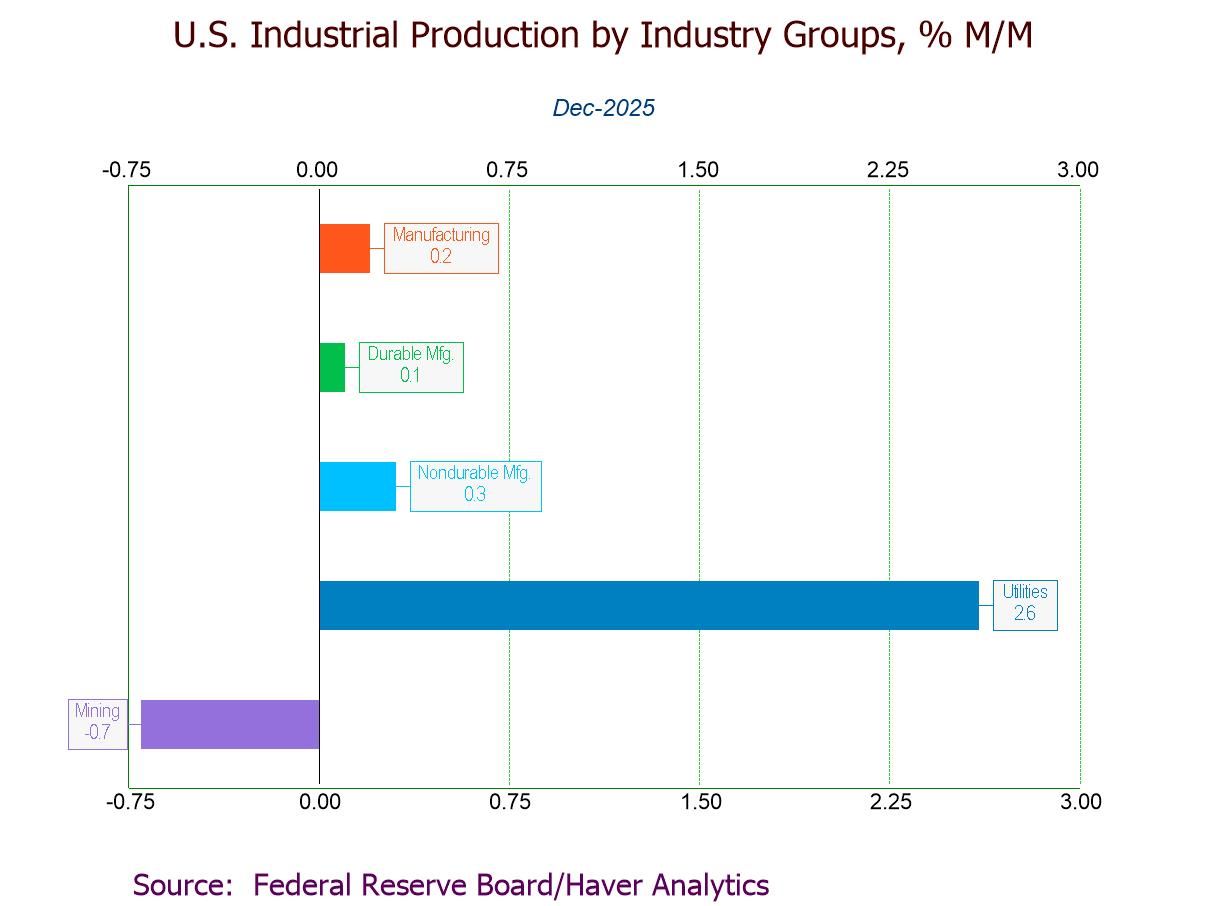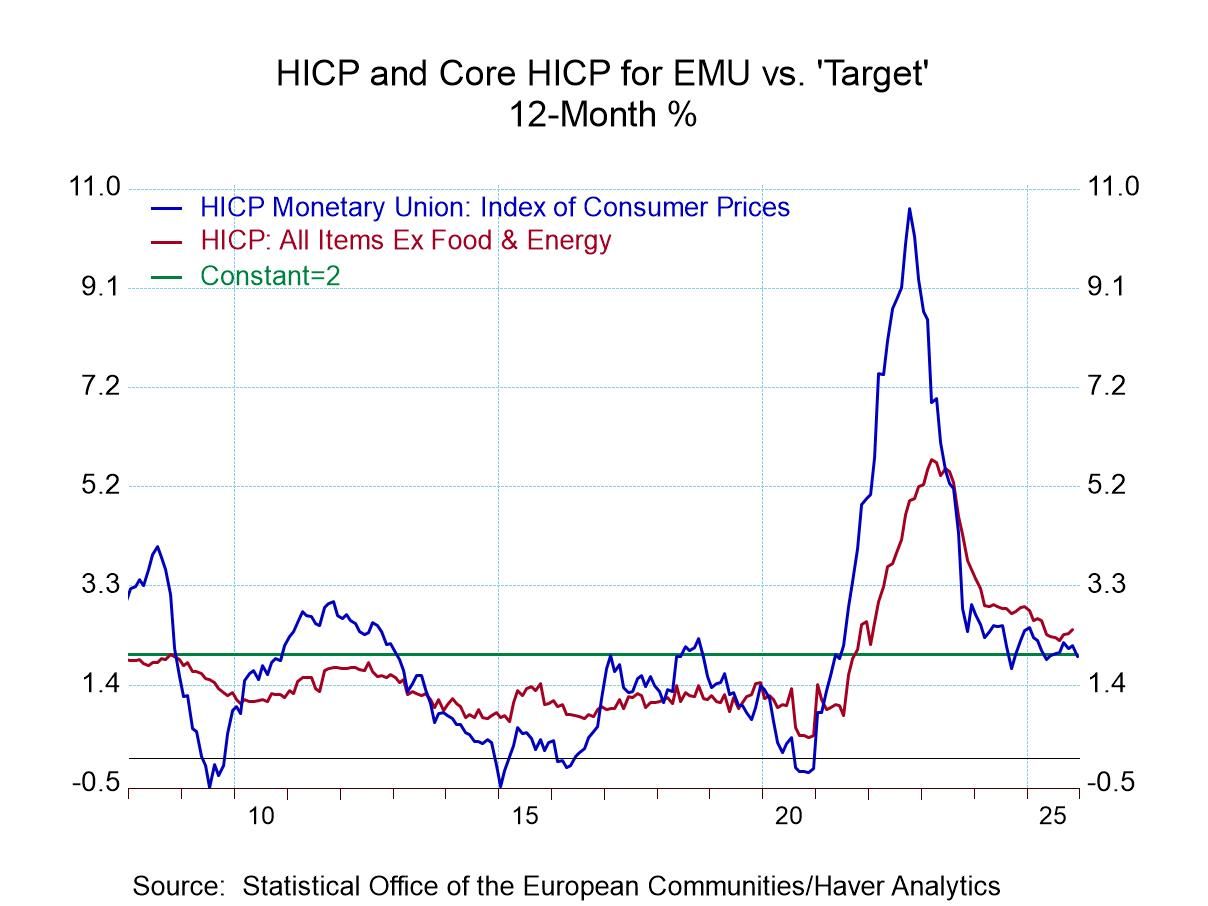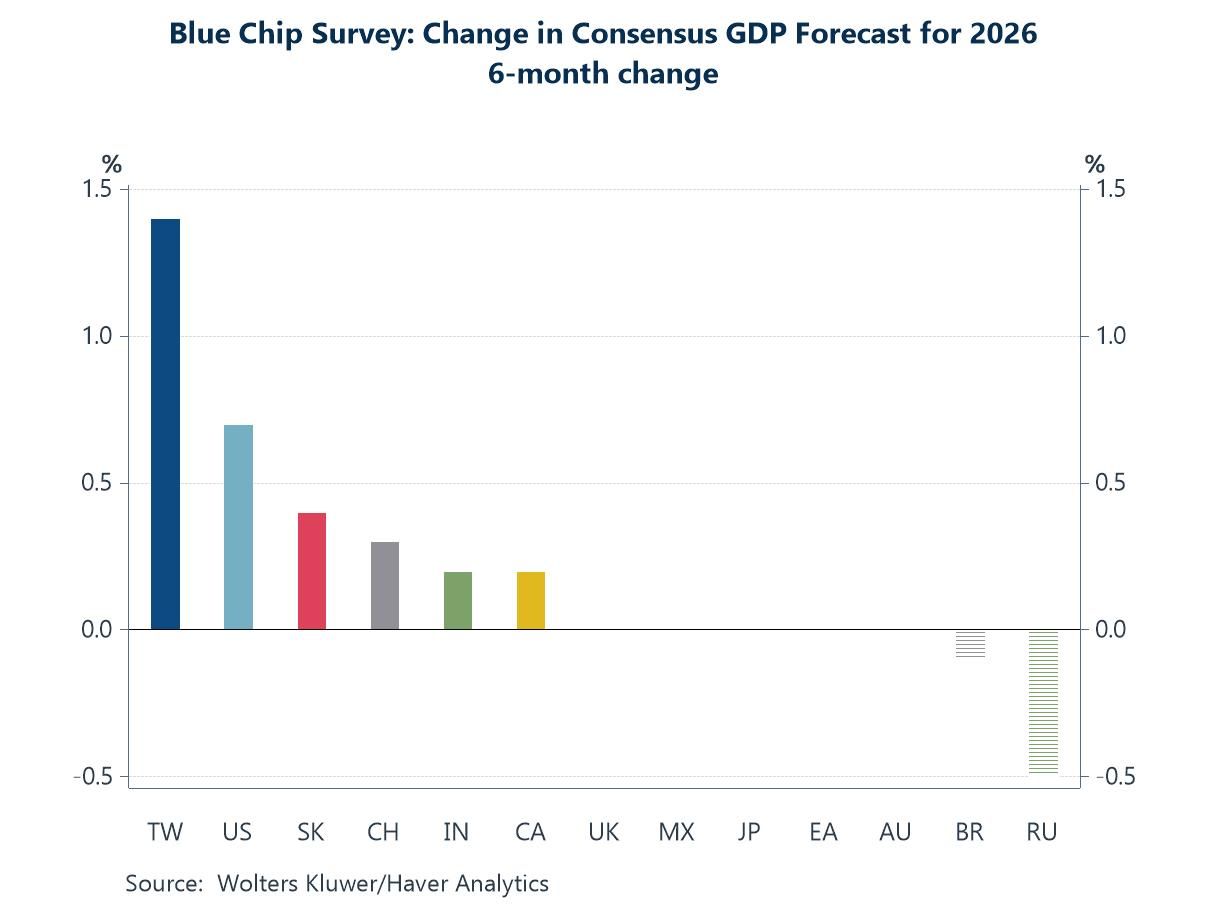 Global| Apr 11 2018
Global| Apr 11 2018U.S. CPI Slips; Core Prices Remain Firm
by:Tom Moeller
|in:Economy in Brief
Summary
Consumer prices eased 0.1% (+2.4% y/y) during March following a 0.2% February increase. It was the first decline in the CPI since May 2017. No change was expected in the Action Economics Forecast Survey. The CPI excluding food & [...]
Consumer prices eased 0.1% (+2.4% y/y) during March following a 0.2% February increase. It was the first decline in the CPI since May 2017. No change was expected in the Action Economics Forecast Survey. The CPI excluding food & energy posted an expected 0.2% increase for the second straight month. Strengthening, however, was the y/y increase to 2.1%, up from the 1.7% low in February.
A 0.3% increase in services prices pulled the y/y gain up to 2.9% from its 2.5% low in November. A 0.1% decline (+2.2% y/y) in recreation services prices held back the overall service price gain. Medical care services prices strengthened 0.5% (2.1% y/y) following a slight decline during February. Medical care services prices rose 0.5% (2.1% y/y) after little change in February. Shelter prices rose 0.4% (3.3% y/y), the strongest increase since August. The owners' equivalent rent of primary residences gained 0.3% (3.3% y/y). Transportation services costs improved 0.2% (4.3% y/y) following a 1.0% jump. The rise included a 0.3% gain (-2.1% y/y) in the cost of public transportation. Recreation services prices eased 0.1% (+2.2% y/y) after two months of 0.1% increase.
Prices for goods excluding food & energy eased 0.1% (-0.3% y/y) after a 0.1% rise. Apparel prices declined 0.6% (+0.3% y/y) following two months of roughly 1.6% increase. Household furnishings & supplies prices eased 0.1% (-1.5% y/y) after little change in February. Furniture & bedding prices fell 1.0% (-1.3% y/y) but appliance prices rose 1.2% (-2.2% y/y). New vehicle prices held steady (-1.2% y/y) after two months of decline. Medical care product prices improved 0.1% (1.4% y/y), also after two months of decline. Recreation goods prices surged 0.3% (-2.9% y/y), the largest increase since February 2011, as sporting goods prices jumped 1.3% (0.8% y/y). Education & communication product prices fell 0.4% (-2.5% y/y) after a 0.5% decline.
Energy product prices declined 2.8% (+7.0% y/y), reflecting a 4.9% fall (+11.1% y/y) in gasoline prices which followed a 0.9% rise. Fuel oil prices eased 0.7% (+20.0% y/y) after a 3.6% decline. Electricity prices held steady (+2.2% y/y) after a 0.4% rise, while natural gas prices declined 1.2% (+3.4% y/y) following a 4.7% surge.
Food prices improved 0.1% (1.3% y/y) after holding fairly steady. Egg prices surged 3.8% (16.3% y/y), the fifth month in six of strong gain. Seafood prices strengthened 1.0% (1.7% y/y) and meat prices increased 0.6% ( 1.4% y/y). Dairy product prices rose 0.3% (-0.9% y/y) and reversed February's rise. Cereal & bakery product prices rose 0.4% (0.1% y/y) after 0.1% dip. Countering these increases was a 0.7% decline (+0.3% y/y) in fruit & vegetable costs that added to February's 0.5% shortfall.
The consumer price data can be found in Haver's USECON database with additional detail in CPIDATA. The Action Economics survey figure is in the AS1REPNA database.
The minutes to the latest FOMC meeting are available here.
| Consumer Price Index, All Urban Consumers (% chg) | Mar | Feb | Jan | Mar Y/Y | 2017 | 2016 | 2015 |
|---|---|---|---|---|---|---|---|
| Total | -0.1 | 0.2 | 0.5 | 2.4 | 2.1 | 1.3 | 0.1 |
| Total less Food & Energy | 0.2 | 0.2 | 0.3 | 2.1 | 1.8 | 2.2 | 1.8 |
| Goods less Food & Energy | -0.1 | 0.1 | 0.4 | -0.3 | -0.7 | -0.5 | -0.5 |
| Services less Energy | 0.3 | 0.2 | 0.3 | 2.9 | 2.7 | 3.1 | 2.6 |
| Food | 0.1 | -0.0 | 0.2 | 1.3 | 0.9 | 0.3 | 1.9 |
| Energy | -2.8 | 0.1 | 3.0 | 7.0 | 7.9 | -6.6 | -16.7 |
Tom Moeller
AuthorMore in Author Profile »Prior to joining Haver Analytics in 2000, Mr. Moeller worked as the Economist at Chancellor Capital Management from 1985 to 1999. There, he developed comprehensive economic forecasts and interpreted economic data for equity and fixed income portfolio managers. Also at Chancellor, Mr. Moeller worked as an equity analyst and was responsible for researching and rating companies in the economically sensitive automobile and housing industries for investment in Chancellor’s equity portfolio. Prior to joining Chancellor, Mr. Moeller was an Economist at Citibank from 1979 to 1984. He also analyzed pricing behavior in the metals industry for the Council on Wage and Price Stability in Washington, D.C. In 1999, Mr. Moeller received the award for most accurate forecast from the Forecasters' Club of New York. From 1990 to 1992 he was President of the New York Association for Business Economists. Mr. Moeller earned an M.B.A. in Finance from Fordham University, where he graduated in 1987. He holds a Bachelor of Arts in Economics from George Washington University.


